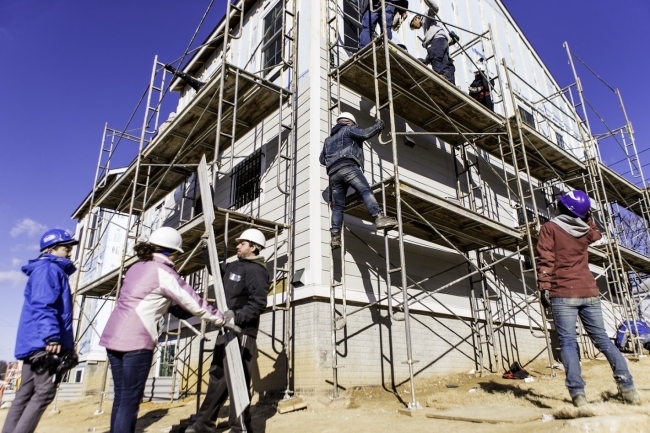You have /5 articles left.
Sign up for a free account or log in.

Work on a Habitat for Humanity project
Service Year Alliance
The next generation of young Americans is in need of a change. They face unprecedented pressure to follow a defined path to success. They’re often stuck in silos, surrounded by peers who match their political ideologies, economic statuses, religions, ethnicities and races. All the while, many have grown increasingly unsure that higher education institutions have a positive impact on the country. And for those people who do view college positively, the cost of earning a college degree is often far out of reach.
As college and university presidents, it is our responsibility to ensure that students and their families view higher education as a realistic and affordable option for all students as they prepare for their futures.
This is why we’ve taken steps on our campuses to redefine the path to success by incorporating a year of national service -- a service year -- into our postsecondary education experience.
We strongly believe a year of national service before, during or after college will better prepare our students to complete their degrees, secure meaningful employment and become lifelong engaged citizens. Service years in higher education have the power to attract top talent, invigorate education, boost work-force development and pave pathways to success for graduates -- all while bridging the deep divisions in society by allowing students to spend a year serving alongside people of different backgrounds.
At West Virginia University, we have hosted Energy Express for a number of years. This past year, almost 510 AmeriCorps members worked in this summer reading and nutrition program for children living in rural communities throughout West Virginia. While these young people served more than 3,000 elementary-age children to prevent the “summer slide” with low-income youth, their own learning was enhanced as they gained valuable skills. Members can also develop unique connections between the campus and the community through The Collaborative, an AmeriCorps VISTA program that the university hosts. Through The Collaborative, we can expand our impact in several areas -- for example, disaster relief, the veteran community and engaged scholarship -- as members work with local partners to alleviate poverty.
At Miami Dade College, we’ve created the Service Year Changemaker Corps -- a peer-to-peer mentoring program that focuses on the more than 300 students at the college who are transitioning out of foster care. In addition, AmeriCorps VISTA members, both current students and alumni, have impacted the lives of tens of thousands of children through their work with South Florida’s America Reads program and have also helped create and sustain vital campus-community partnerships with the My Brother’s Keeper program, the Urban Paradise Guild, Miami Dade County Public Schools and others through service-learning initiatives. Through the college’s Single Stop program, these corps members have also been instrumental in helping low-income students get into college and graduate. Miami Dade is committed to being a leader in innovative ways to solve common challenges facing our students.
At Tufts University’s Jonathan M. Tisch College of Civic Life, we are studying, promoting and enhancing the value of service to young people’s academic, professional and civic development. Our 1+4 Bridge-Year Program gives accepted students the opportunity to do a year of full-time service learning in the United States or around the world before they start their studies on our campus. And the Talloires Network, founded at Tisch College, supports more than 350 higher education institutions in 75 countries across the globe in providing community-based opportunities for their students.
We’ve been witness to the power of national service to arm our students with the skills and experience they need to pave their own paths to success. Retired U.S. Army General Stanley McChrystal, chair of the Service Year Alliance, makes a strong case for empowering our next generation to serve in his book Team of Teams (Portfolio, 2015). He states that by empowering these young people to solve issues in their community, we are in turn giving them the skills and confidence they need to solve their own similar problems in their educations and future careers. We could not agree more. These service year experiences are shaping our students into more active citizens and leaders, while also making a tremendous difference in our local communities and helping our colleges and universities fulfill our commitment to better engage in those communities.
That is why we have joined more than 200 higher education leaders to call on Congress to expand national service opportunities with programs like AmeriCorps, the Peace Corps and YouthBuild. We are particularly concerned about funding for AmeriCorps, which not only supports national service opportunities like those on our campuses but also rewards students who complete their year of service with money to invest in higher education or to pay back student loans.
At a time when our students are eager to take their futures into their own hands, embracing national service on our campuses is the least we in higher education can do to deliver on our promises of providing students with the best educational opportunities possible.
We encourage all college and university leaders to follow our footsteps by signing on to our letter to Congress and joining us in calling on Congress to increase funding for AmeriCorps and other national service programs. Embracing a service year is a step in the right direction toward securing the confidence of our next generation of students.




